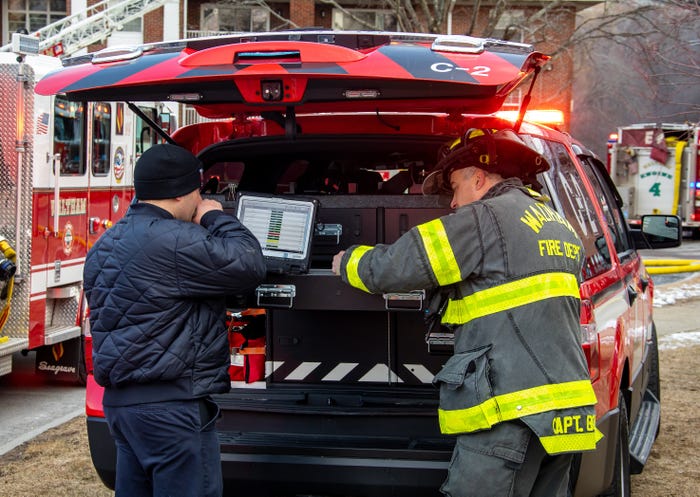Axon, Cradlepoint team to support Burbank police broadband applications

Police personnel in Burbank, Calif., are using Axon video solutions and Cradlepoint broadband connectivity to provide reliable, secure access to footage depicting the situations that officers encounter, according to officials for both vendors.
Vehicles used by the City of Burbank’s police department are equipped with Axon’s Fleet 2 in-car video system, Axon Body 3 body cameras, and the Axon Evidence software platform to manage video evidence. Broadband connectivity is provided by Cradlepoint’s 1700-series in-vehicle wireless edge routers that feature LTE and Wi-Fi modems, as well as NetCloud network-management software from Cradlepoint, which was purchased by Ericsson in September 2020.
Blake Bullock, director of Axon’s Fleet product line, said bundling these Axon and Cradlepoint product suites has been beneficial to both companies and the public-safety agencies they serve.
“The in-car video system—which is relying on wireless network to have Internet connectivity to move the video for later review—is highly dependent on the networking capabilities within that vehicle.,” Bullock said during an interview with IWCE’s Urgent Communications. “Those two systems particularly have a high level of interaction, which requires a certain amount of compatibility and testing.
“It means that there’s an opportunity to offer to the customer a solution that’s already been pre-validated to work together. They’re not buying two disparate things from two different companies and trying to figure out the challenges of making them work together. The result is that, when we now deploy to a customer, the solution is working out of the box. There are no problems.”
Other broadband connectivity are available to public-safety agencies—notably, a laptop with an LTE modem or a mobile hotspot like the Verizon Jetpack—but the Cradlepoint LTE routers are significantly better for agencies, in terms of both performance and usage flexibility, according to Bullock.
“Not only for coverage reasons but also for performance of the network within the car, that mobile-router approach is so far superior to the other two choices,” he said. It gives you a strong Wi-Fi network in and around the vehicle for all devices to interact with, and it gives you a strong LTE connection back to the towers for the Internet connection
“One of the reasons why it is better is that you typically mount an external antenna, that’s a very good antenna, on the roof of the car. That give you much better range, reception and data speeds than using an antenna that’s mounted somewhere inside that laptop or puck. Another reason is that the Wi-Fi network that you establish allows for any Wi-Fi-capable devices to leverage that Internet connection back to the towers, as well. So, it gives the agency a lot more options about networking in the car.”
Donna Johnson, Cradlepoint’s vice president of product and solution marketing, echoed this sentiment.
“Burbank is really just one of many customers that we work on jointly with Axon,” Johnson said during an interview with IWCE’s Urgent Communications. “Axon resells the Cradlepoint solution, along with their dash- and body-cam systems. So, quite a few of the police districts around the country that are using Axon solutions are using Cradlepoint.”
“In the case of Burbank, prior to Cradlepoint, they were using USB dongles or hotspots, so they didn’t have an in-vehicle router until they went to Cradlepoint.”
Garen Essakhanian, operations manager for the city of Burbank’s IT department, said he is pleased with the police connectivity package.
“The flexibility of Cradlepoint routers helped us dramatically improve network connectivity and signal strength in our police vehicles,” Essakhanian said in a prepared statement, also noting the relative ease of managing the system.
“Cradlepoint NetCloud is amazing. I use it for everything, such as monitoring each vehicle’s data usage and troubleshooting on the fly. And I do it all from a mobile app on my phone.”
Dane Surkamer, Cradlepoint’s strategic partner manager, said Cradlepoint’s close relationship with Axon has proven helpful in recent years—particularly in 2020, when logistical and financial challenges associated with the COVID-19 pandemic made it difficult for companies like Cradlepoint to get face-to-face meetings with some city officials.
“They [Axon representatives] are the subject-matter experts on the law-enforcement side,” Surkamer said during an interview with IWCE’s Urgent Communications.
Currently, the Burbank police department uses Verizon as its lone LTE carrier, but the installation of Cradlepoint 1700-series routers gives the agency the option of utilizing a second carrier to maximize coverage and performance in the future, according to Surkamer.
Bullock notes that such investments let agencies like the Burbank police department consider applications like livestreaming video in the future, such as from the Axon Fleet 3 in-car camera that is scheduled to be launched this year.
“[The Fleet 3] has some additional capabilities that need strong wireless networking,” Bullock said. “Forward-thinking agencies like Burbank that are deploying a capable wireless router in the car are going to be able to take advantage of that through some of the new capabilities coming in Fleet 3
“It’s a tool that will help with critical incidents. It’s a tool that will help with officer safety. And it’s a tool that will just help agencies make better use of the resources that they have while watching their officers’ backs when they are in the field. With the power of the Cradlepoint router, we can offer a capability like that.”
Surkamer reiterated that Cradlepoint’s roadmap includes 5G connectivity via sub-6 GHz spectrum in the future. Bullock noted such plans underscore the value to agencies making an investment in broadband connectivity today while preparing for upcoming technological developments.
“As we go forward in deploying Fleet in-car video systems at agencies, our recommendation and requirement is to include the Cradlepoint mobile router in that deployment—so much so that, from a pricing perspective, we’ve bundled it together, so it’s one-stop shopping for our customers,” Bullock said.
“That’s undoubtedly the best solution for Fleet vehicles in the market today. Ultimately, we’ll find the right time to switch over to 5G capability, but even with today’s 4G LTE, it’s performing very, very well for all of the use cases that we’ve deployed for in-car camera, video livestreaming and even license-plate recognition, which is a new capability that we’re deploying with Fleet 3 this year, as well.”





